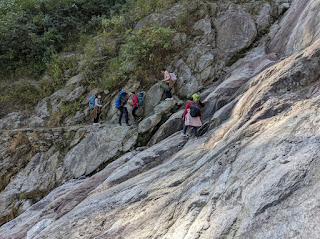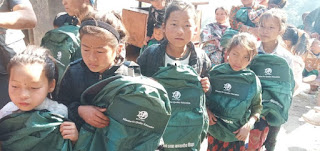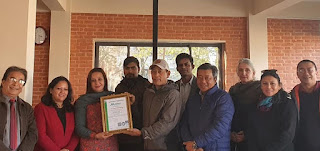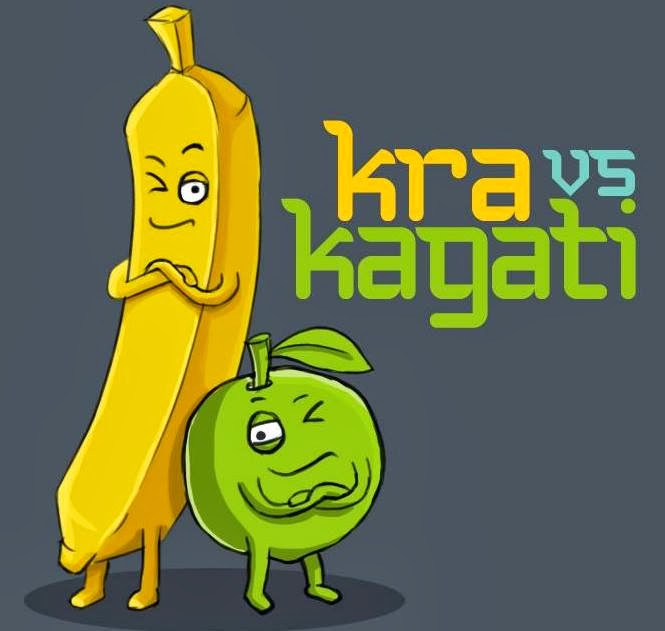Institute of Cultural Nepal (ICA Nepal) joined hands with NPO Nepal Volunteer Service to distribute educational and healthcare materials along with Need Assessment at the Northern Part of Sankhuwasabha and Makalu-Barun Areas. The 6-day trip remained fascinating and unforgettable. We started off this beautiful road journey with our colleagues, enjoying the marvelous landscapes bounded by nature. It approximately took us 2days to reach Khadbari along with some short visits to Khotang Haleshi Temple, and some renowned places of Nepal such as Diktel, Okhaldhunga, Sindhuli, Hile, Mid Hill Highway that connects the eastern border to the western border of Nepal, running through different important townships, settlements and other places of approximately 1776 Km, etc. The trip remained very refreshing; however, the road construction was still being carried out at most of the parts, leading to some disturbance.
Khadbari was surrounded by breathtaking scenery and mountain views, the local people were also very kind and innocent; additionally, they welcomed us with great hospitality. The next day, we headed towards the Barun. On our way to Barun, we distributed some health relief materials such as sanitary napkins, soap, sanitizers, masks, COVID prevention posters at Paukhola Health Post, Karmarang. They also enlightened us about the conditions of health posts and requirements for Medical Equipment such as beds and generators in Karmarang and other health centers as well. Next, we supported some educational materials at Shree Krishna Higher Secondary School, Gola. The students there need to take a long 3-4 hour route and come to study. They lack nutritious lunch and a good place to live. The Need Assessment concluded that they require proper Hostels, especially for girls. The day-to-day activities of these students have been very troublesome. To gain Higher Studies they further need to visit different other places that take around 6 -7 hours on foot as there are no other means of transportation and are forced to drop out of school even though they wish to study more and reduce the illiteracy/ poverty rate of the village. It took us almost 10hours to reach Barun.
On the auspicious occasion of Magh-1, the local people tend to visit Barun to take Holy Bath and attend the local fair. The water comes from Shiva Parvati Dhara and is said to be very sacred. People travel for over a day and hours to attend the fair. They stay up all night to light up the diyo-batti and involve each other in other activities such as cultural dancing, having fun, drinking, and shopping. The electricity and transportation are not reached in the very place along with accommodation disturbance. People light up torch lights and tuki to eliminate dark. The religious tolerance and social clubs were highly seen at the place where people adapting different ethnic groups i.e Sherpa, Magar as well as horizontal groups were seen there. The houses are most likely to collapse as many of them are constructed using local bamboo, and woods. The next day, people take a holy bath early in the morning and return to their house with a great time. Reportedly, the fair carries a lot of faith and beliefs of local people as many people including children, and the elderly were seen traveling for a day or two and look forward to attending these in the near future as well.
On the fourth day, we worshipped the Barun river and headed to Ekuwa Village. Alaichi`s farming was highly observed as a source of income generation. Due to Alaichi farming, people tend to farm fewer cash crops and buy overdue rice from India at a low price. The Alaichi cultivation could be diversified with Kiwi, Coffee, and other farming. The locals highly consume junk foods; neglects farming fresh cash crops as it requires hard work and more care. The children would rather eat noodles and biscuits than rice and vegetables. Every day, more and more housewives find it easier to cook instant noodles and serve their families. During our visit to Ekuwa village, we stopped by another school and distributed educational materials to the students. The students welcomed us with ‘Khada’ and ‘Mala’. Further, we trekked for 7-8 hours and crossed some of the dangerous landscapes, looking at the beauty of nature and mountains. On the way, we met an adorable 9-year-old girl, Sandhya, returning from the fair. We were going on the same route; next, she showed us the way to the village. The landscapes were very dangerous for us to cross but for her, it was a piece of cake. She also told that when she was a child she used to visit this forest to fetch grass for her cattle. The local people prefer walking rather than taking the mode of transportation as they have rare visits on the vehicle, they tend to get dizzy, and nauseous. The old women were seen taking the wool off to make clothes further. We also met a 16-year old boy, Nima who was returning to his home on occasion after being far away to gain an education. After our conversation with him, he told us that he want to get further education and do something good by utilizing local resources for his locality rather than going abroad. He was very kind and helped us with our loads as well.
In Ekuwa, the students and teachers were waiting for our arrivals with hands full of Mala, Khada, and Flowers at Ekuwa Basic School. After the successful distribution of educational and healthcare materials, we held a meeting with the School’s Representative. Next, the local people lit up huge woods for fire and showed us their cultural dance, music, and local dishes. We were very grateful for all the love and support they provided us with. The locals were seen carrying heavy loads due to a lack of transportation. They also need to carry the sick people in their back due to lack of healthcare posts. During our visit, the people were expecting of getting more than just donations. We also observed discrimination as Dalits were not allowed to enter the kitchen whereas other ethnic groups were warmly welcomed inside the house. Every night, people would gather at certain places to have drinks, food and spend time. They use solar power as a source of electricity. The unmanaged water source has also been causing problems in the area as livestock pollute the water. The construction of the reservoir was considered essential.
On the fifth day, we hiked for around 6 hours and reached a scared cave at Sisne. The cave was founded by the local children while chasing bats. The cave carries a lot of cultural faith among the local people. Every day, the cave welcomes 50-60 people fasting and worshiping gods inside the cave as Ganesh, Shiva-Parvat, Naag, Ram-Sita, Hanuman. The cave remained a very memorable and breathtaking adventure for us. Next, we returned to Khadbari by vehicle. We also saw a bunch of people visiting Dobhan for the next fair, those who cannot go to Makalu Barun, go to Dobhan. It also showed high religious tolerance and unity of people. The people had no greed and were willing to invest their time in the holistic development of the locality.
On the 6th day, we went to Manakamana Temple, the priest enlightened us with its details and after that, we took a flight to Kathmandu with great learnings and new experiences. The trip will forever be treasured by each one of us. During the visit, the travel plan, team spirit, and commitment to achieve the goal made it possible and we are forever grateful for the acknowledgments. After the visit, we wish to develop proposals and draw more attention regarding this subject matter.
Prepared by: Swikriti Parajuli
I’m a student and I believe in learning and sharing. Besides community development, I’m passionate about arts, music, and sports.
ICA Nepal is an experienced team dedicated to working in the field of human capacity building, and community development through advanced methods. It pursues to recognize people’s initiation, creativity, and enthusiasm in bringing sustainable development by considering existing cultural dynamics and pluralities. It is committed to creating an environment, in which the opportunity to participate and the construction of sustainable change and development is foremost.




























